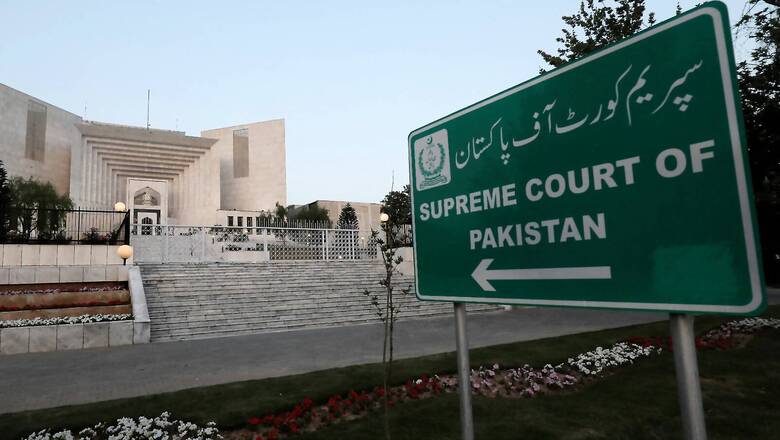
views
The toxic politics and personality of Imran Khan has pushed Pakistan into a full-blown political and constitutional crisis. That this has happened at a critical time when the economy is in a free fall has only worsened an already fraught state of affairs. What Pakistan desperately needed was someone to pull it out of the hole it finds itself in; what Imran Khan has done is dig the hole deeper. It is almost as though if he doesn’t get what he wants, he and his cult wouldn’t care a whit what happens to Pakistan. But the problem is that even if he is propitiated, it will almost certainly not arrest, far less reverse, Pakistan’s headlong march into the abyss.
Imran Khan and his flunkies knew that they were going to lose the No Confidence Motion (NCM) moved in Pakistan’s National Assembly by the combined opposition which had won over not only the ruling PTI’s coalition partners but also two dozen Pakistan Tehreek-e-Insaf (PTI) rebels. All the stratagems and shenanigans of Imran to defeat the NCM had come a cropper. But rather than gracefully accept defeat, being the sore loser that he has always been, he decided to use the constitutional equivalent of ball-tampering and match fixing to not let the NCM succeed.
The flagrant violation of all constitutional norms, parliamentary procedures and processes, and political proprieties by abusing the powers of the Speaker of the National Assembly to disallow the NCM, and then advise the President to dissolve the National Assembly and call for fresh elections in 90 days have brought Pakistan to a standstill. There is no government since that fateful Sunday (April 3) when Imran pulled his dangerous stunt on his country’s fragile democracy.
ALSO READ | Failure of Democracy is Rooted in the Idea of Pakistan
Supreme Court and Three Possible Rulings
The focus has now shifted to the Supreme Court of Pakistan which has taken upon itself to decide on the constitutionality of what transpired in the National Assembly on April 3. There are broadly three possible rulings that the Court can give but regardless of what the Court rules, Pakistan is entering into a phase of severe political, economic and social instability.
Option 1: The Speaker violated the constitution and everything that followed from that fateful ruling of the Speaker is void ab initio. This will mean that the National Assembly stands restored and the No Confidence Motion will be voted upon on the floor of the House. Given that the opposition has the numbers, the motion will be carried. The President will then seek a vote of confidence for a new leader of the House. The consensus candidate of the opposition is Shehbaz Sharif and he will become the next Prime Minister.
Option 2: The Court can rule that the Speaker violated the constitution and circumscribe or define the powers of the Speaker so that these are not abused as brazenly as they were on April 3. At the same time, the Court will not turn the clock back and rule that now that elections have been called, the best way forward is to seek a new mandate from the people. In other words, elections will have to happen in the next 90 days. A caretaker government will take office in Islamabad.
Option 3: The Court can endorse the action of the Speaker (effectively giving a carte blanche to presiding officers to do what they want in the future and making the Speaker’s office a parallel power centre). In the immediate instance, this means that elections will take place in 90 days. But the political and constitutional implications of this option will be far-reaching and quite destabilising in the future.
In all likelihood, the Court will decide between the first two options. But since it is Pakistan we are talking about and the judiciary in that country hasn’t quite ever acquitted itself honourably – the current bench has a couple of extremely dubious characters – option 3 cannot entirely be ruled out.
If Court Restores Assembly
If the Court restores the Assembly, then the most likely scenario is as follows:
Shehbaz Sharif will form the government and his cabinet will have members from all opposition parties. The government will try to clean up some of the political mines that the Imran Khan regime planted – voting rights for overseas Pakistanis, use of electronic voting machines etc. It will also try some economic management to stabilise the tanking economy. But this government is unlikely to serve out the remaining term of the National Assembly which ends next August.
Within a month or two, after purging the ‘Imranists’ in the bureaucracy, the Shehbaz government will dissolve the House and go for fresh elections which will have to be held within 60 days. There will be a lot of politicking over the next 30-45 days because the new government will also have to get the provincial assemblies dissolved so that simultaneous elections can take place for both the national and provincial assemblies. There is a high chance that the new government will book Imran Khan and his fellow conspirators on charges of subverting the constitution.
If Assembly is Not Restored
If however the Assembly is not restored, then a caretaker set-up will take office. Two scenarios are possible in this case, the first if all other things remain the same, the second if other things spiral out of control:
Scenario One: The caretaker PM, whoever it is, will form a caretaker cabinet and go for elections. The caretakers will only warm the seat for the next government which will almost certainly not be a PTI government – Pakistan cannot survive if Imran Khan wins another term, and therefore his defeat is virtually written in stone. But given that the caretakers will neither have the mandate nor the time to take the extremely difficult decisions that are required to rescue Pakistan from a meltdown means that they will at best do a holding operation. The next Prime Minister who will be in office by the end of July will wear a crown of thorns and will immediately confront the onerous task of stopping a meltdown.
Scenario Two: With the political mess continuing, the drift in governance not being arrested, and the economy facing a meltdown, the military is forced to step in. The way the Army has kept a hands-off approach in the current crisis is quite uncharacteristic of Pakistan’s largest, most powerful political party. There are suspicions that the Army is letting the politicians hang themselves and make a complete hash of things. Once matters start spiralling out of control, there will be a clamour for the Army to step in and set things right. Already, even the opposition politicians are looking askance at the Army playing neutral and demanding that it play its role to prevent Imran Khan from subverting the constitution. Meanwhile, the economy is on the brink of becoming another Sri Lanka, even worse, Lebanon.
ALSO READ | Imran Khan Was Never Really a Smart Cookie but Now He Has Run Out of Luck
A Coup with a Difference?
Neither a caretaker cabinet which is warming the benches for the next government, nor even an interim Shehbaz government will be equipped to handle the looming crisis. Any interim political government will have its eye on the next election and the last thing it will do is administer a bitter pill – a massive rise in fuel prices and power tariffs, allow the rupee to devalue by over 10-15 per cent, raise interest rates, withdraw subsidies, raise taxes – to an economy which is already on the ropes. An elected government might do all this, but only after the election.
The problem is Pakistan just doesn’t have the luxury of time. Ninety days for another government is too late. A full-blown crisis will probably not wait until the next government takes office. Therefore, a very likely scenario going forward is as follows:
A caretaker government will be set up, and it will be backed by the Army. This way the Army will intervene but without appearing to have intervened directly. In other words, a coup with a difference. The Caretaker Prime Minister will not be some compromised retired judge but either an able administrator or an economist (no, chartered accountants and MBAs are not economists) with some experience of administration. Elections will be postponed and not held within the constitutionally mandated 90 days – a justification for this will be found by an expansive interpretation of Article 254 of the much-abused and distorted constitution of Pakistan, and of course the infamous ‘doctrine of necessity’.
How long the caretaker remains in office is anyone’s guess – it could be six months, it could be an year, it could be longer. This government manned by ‘technocrats’ and backed by the military will try to arrest the collapse of the economy and fix some of the foreign and security policy blunders made by Imran Khan. The politicians, especially in the opposition, will make a song and a dance about such a move, but eventually pipe down and wait for their turn. Imran Khan and his cronies will get their comeuppance. Some of them might have to cool their heels in jail. Stories of corruption and abuse of power of Imran Khan will come pouring out.
Of course, if the military continues to scrupulously maintain a hands-off approach, then all one can do is to repeat the evocative words of the former dictator Pervez Musharraf while exiting the Aiwan-e-Sadr: Pakistan ka Khuda hi Hafiz (Only God can protect Pakistan).
Sushant Sareen is a senior fellow at Observer Research Foundation. The views expressed in this article are those of the author and do not represent the stand of this publication.
Read all the Latest Opinion News and Breaking News here




















Comments
0 comment